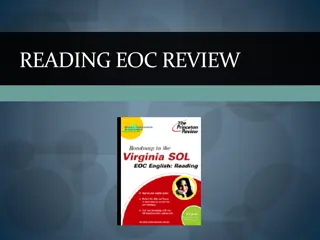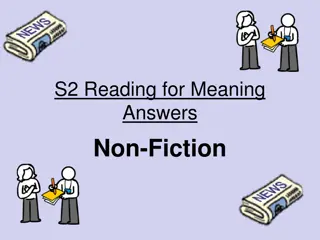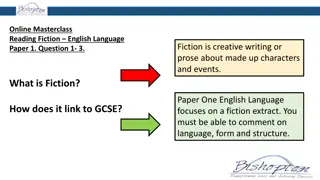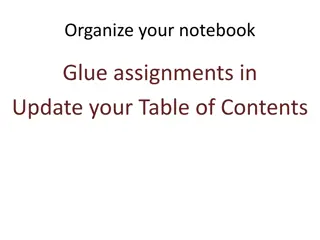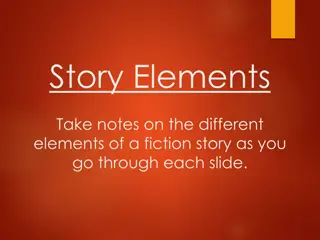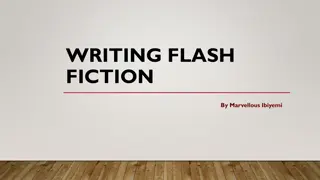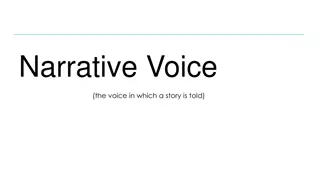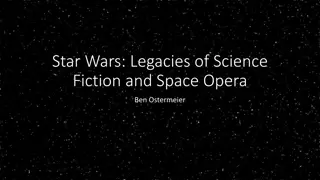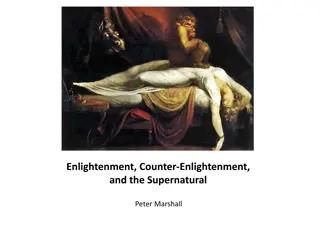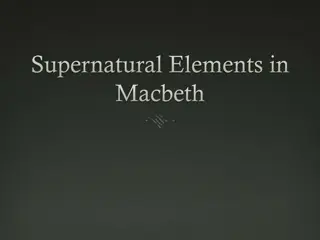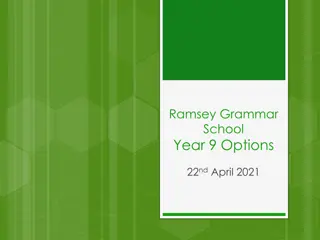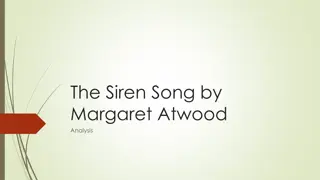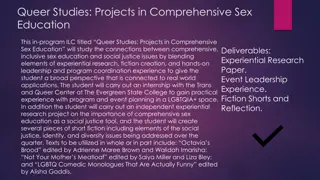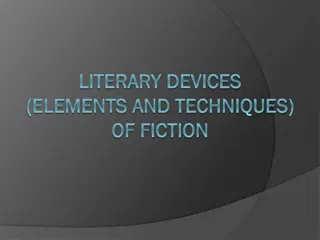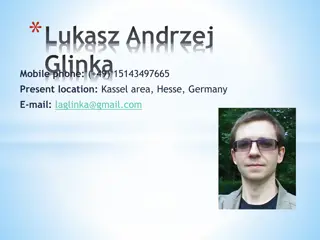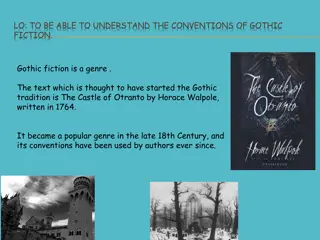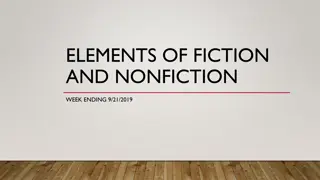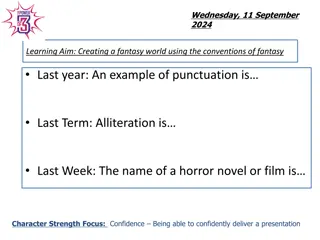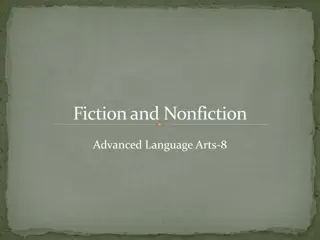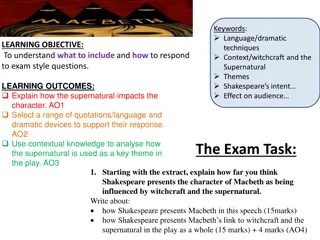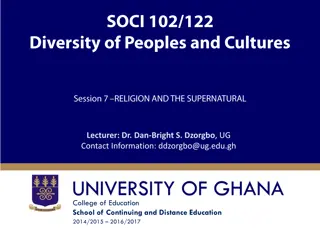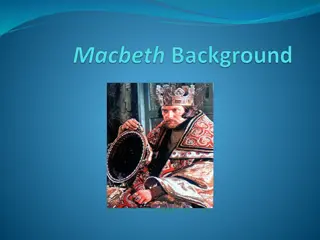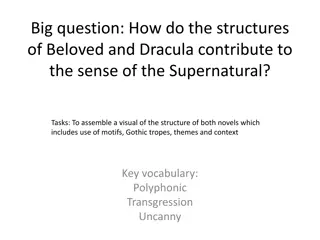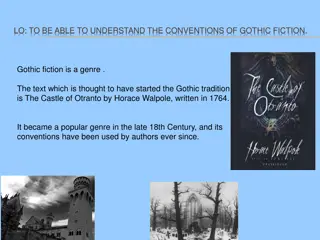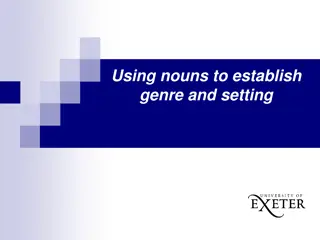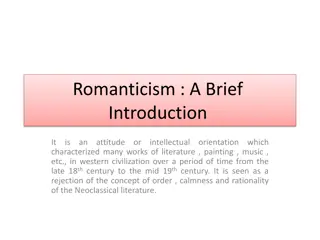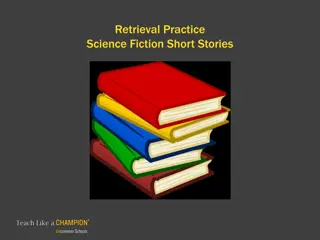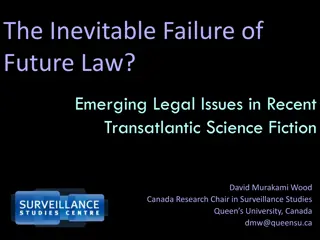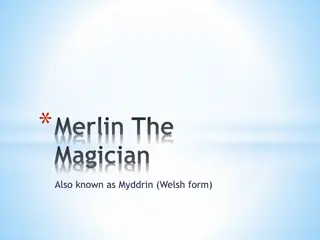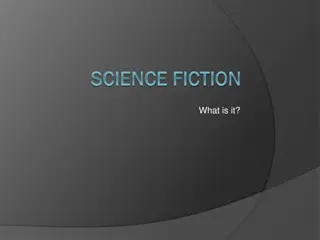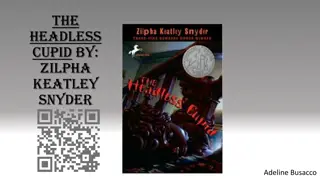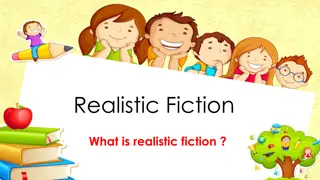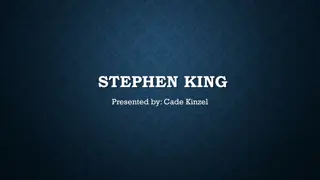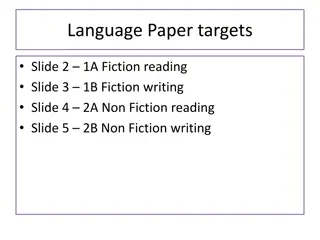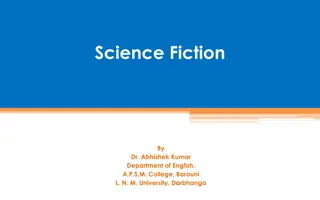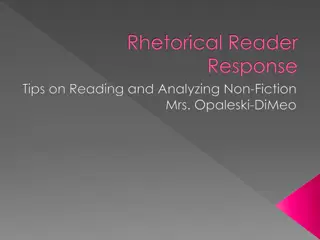Exploring Citizen Journalism and Non-Fiction Writing
Explore the world of citizen journalism and non-fiction writing, learning about text types, adapting writing to conventions, considering audience, purpose, and tone. Discover the significance and usefulness of non-fiction writing, and delve into creating various text types. Uncover the role of citiz
1 views • 11 slides
Reading EOC Review: Test Structure, Types of Selections, and Breakdown
The Reading EOC Review covers the test makeup, types of reading selections, and breakdown of questions and content to help you prepare effectively. The test comprises sections with 55 scored questions to be answered, focusing on functional literacy and narrative/fiction elements, including poetry, p
8 views • 26 slides
Exploring Contemporary Non-Fiction Themes
Delve into diverse non-fiction topics such as pet pampering, societal contradictions in teen reading habits, environmental concerns like plastic pollution, and societal opinions on education and lifestyle choices. Discover intriguing discussions and thought-provoking insights in this engaging collec
0 views • 55 slides
Understanding Fiction Through Text Analysis: Paper 1 English Language Masterclass
Delve into the world of fiction through an analysis of the novel "Girl With a Pearl Earring". Explore how language, form, and structure are used in the extract to captivate readers. Discover the characters, setting, and narrative techniques employed by the writer to engage and intrigue readers. Unco
2 views • 7 slides
Exploring Historical Fiction: Elements and Examples
Discover the essence of historical fiction, its key elements, and examples like "Forrest Gump." Learn how plausibility and interpretation play pivotal roles in creating captivating narratives that blend fiction with historical events.
0 views • 11 slides
Spring 2015 English 110 Final Exam Information
Spring 2015 English 110 Final Exam includes an Essay Final Exam to be completed by May 21st and an Objective Final Exam on May 27th or May 28th. The Essay Final consists of flash fiction tasks, literary criticisms, and analysis, while the Objective Final covers fiction elements identification and an
0 views • 7 slides
Essential Elements of Fiction Storytelling
Dive into the key components that make up a compelling fiction story, including plot development, setting, mood creation, character conflicts, and the use of imagery and dialogue to enhance the reader's experience. Explore these foundational elements to enhance your storytelling skills.
1 views • 36 slides
Crafting Compelling Flash Fiction: Techniques and Examples
Dive into the world of flash fiction with this informative piece detailing the essence, types, and techniques of writing succinct yet gripping stories. Learn how to hook readers from the start, use impactful scenes over summaries, and create lasting impressions with minimal words.
0 views • 18 slides
Understanding Narrative Voice in Fiction Writing
Explore the elements of narrative voice in fiction writing, including tense, perspective, and language choices. Learn how authors decide on the tense and perspective for their stories, and consider different language styles that suit various characters and perspectives. Discover the nuances of first
1 views • 7 slides
Influential Works in Science Fiction and Space Opera Literature
Explore the significant influence of classic science fiction novels like "War of the Worlds," "A Fighting Man of Mars," "Second Foundation," "2001: A Space Odyssey," and "Children of Dune" on the creation of iconic space opera narratives such as Star Wars. Delve into the themes, settings, and charac
0 views • 16 slides
Enlightenment, Counter-Enlightenment, and the Supernatural
The relationship between religion and the Enlightenment was characterized by a shift towards viewing them as non-antagonistic entities, despite some lingering conflicts. While the Enlightenment aimed to combat religious bigotry and superstition, it did not eradicate supernatural beliefs entirely, le
0 views • 8 slides
Supernatural Elements in Macbeth: Witches, Dagger, Ghost
The supernatural plays a crucial role in Shakespeare's "Macbeth," providing intrigue, insight into characters, and enhancing pivotal scenes. From the mysterious witches to the eerie floating dagger and haunting ghost of Banquo, these supernatural elements add depth and complexity to the storyline, r
0 views • 13 slides
English Language Cambridge IGCSE Course Overview
Students of the Ramsey Grammar School Year 9 English Language Cambridge IGCSE course will engage in reading and analyzing various fiction and non-fiction texts, honing comprehension skills, crafting written pieces with clarity and purpose, and enhancing their ability to summarize and re-imagine cont
1 views • 7 slides
Margaret Atwood's Analysis of "The Siren Song
Margaret Atwood, a renowned Canadian author, delves into the plight of humans through speculative fiction with elements of dystopia and science-fiction. She is an environmentalist who addresses issues like global warming in her works. Atwood's writing style includes free verse poetry with enjambment
16 views • 18 slides
Exploring Comprehensive Sex Education and Social Justice Connections
This program, "Queer Studies: Projects in Comprehensive Sex Education," delves into the intersection of inclusive sex education and social justice issues through experiential research, fiction creation, and hands-on leadership experiences. The student will intern at the Trans and Queer Center, condu
1 views • 6 slides
Explore Literary Devices and Elements of Fiction
Dive into the world of literary devices and elements of fiction, including setting, mood, plot, flashback, and foreshadowing. Understand how sensory details enhance writing and learn about techniques such as allusion, figurative language, and more. Discover the significance of these elements in shap
1 views • 28 slides
Lukasz Andrzej Glinka - Non-fiction Writer and Science Author with a Diverse Academic Background
Lukasz Andrzej Glinka is a prolific non-fiction writer and science author known for his extensive publication record, academic achievements, and editorial contributions. With a background in theoretical physics and a wealth of experience at prestigious research institutions worldwide, he has establi
0 views • 6 slides
Understanding Gothic Fiction Conventions
Explore the origins and key features of Gothic fiction, including dark settings, supernatural elements, and eerie atmospheres. Analyze gothic story openings and extract examples from works like Frankenstein to understand gothic features and emotional impact.
0 views • 25 slides
Exploring Elements of Fiction and Nonfiction in Classroom Activities
Engage students in a week-long journey to explore elements of fiction and nonfiction through class activities centered around reading, discussion, vocabulary building, and comprehension quizzes. From learning terms and definitions to analyzing stories, students will enhance their understanding of di
0 views • 6 slides
Ernest Hemingway: A Brief Overview of His Life and Works
Ernest Miller Hemingway, born on July 21, 1899, was a renowned American novelist, short story writer, and journalist who left a significant mark on 20th-century fiction. Hemingway's distinct writing style and adventurous life influenced many generations. He produced numerous iconic works, including
0 views • 20 slides
Exploring Fantasy Worlds: Conventions, Types, and Challenges
Dive into the realm of fantasy literature and learn about the conventions, types, and differences between fantasy and sci-fi. Uncover the definition of fantasy, explore popular genres, and discover sub-genres like fiction, science fiction, and historical fiction. Engage in thought-provoking challeng
0 views • 17 slides
Washington Irving: Father of American Fiction and Pioneer of American Romanticism
Washington Irving, an influential American author of the early 19th century, is revered as the Father of American fiction. Known for iconic works like "The Legend of Sleepy Hollow" and "Rip Van Winkle," Irving played a crucial role in establishing American literature as an independent art form. His
1 views • 14 slides
Understanding Fiction and Nonfiction in Language Arts
Fiction and nonfiction are two key genres in literature. Fiction involves imaginative storytelling with elements like plot, characters, setting, point of view, and theme. Nonfiction, on the other hand, deals with real people, events, and ideas, aiming to inform, persuade, or entertain readers. Explo
0 views • 14 slides
Shakespeare's Portrayal of Macbeth's Interaction with Witchcraft and the Supernatural
Shakespeare explores Macbeth's deepening connection to witchcraft and the supernatural through a compelling dramatic monologue where Macbeth grapples with a hallucination of a dagger. This extract delves into Macbeth's internal turmoil, hinting at the influence of supernatural forces on his actions
0 views • 22 slides
Understanding Religion and the Supernatural in Society
This session introduces the concept of religion and its connection to the supernatural, exploring various definitions, sociological and anthropological perspectives, theories, and functions of religion. The session aims to enhance understanding of religious diversity and the significance of supernat
0 views • 10 slides
History and Supernatural Intrigues Surrounding Macbeth and King James I
Macbeth, written around 1606 to honor King James I's ascension, drew inspiration from Scottish history and set in 11th century Scotland. King James I's rule in Scotland and England, marriage to Anne of Denmark, and encounters with the supernatural, including witchcraft accusations, are intriguing fa
0 views • 21 slides
Analyzing Supernatural Elements in the Structures of Beloved and Dracula
Explore the influence of structure on the supernatural in Beloved and Dracula through motifs, Gothic tropes, themes, and context. Understand the concepts of polyphonic, transgression, and the uncanny in relation to the novels, while considering elements like multiple voices, shifting identities, and
0 views • 12 slides
Understanding Gothic Fiction Conventions in Literature
Gothic fiction is a captivating genre rooted in dark, mysterious settings, supernatural elements, and eerie atmospheres. Originating with "The Castle of Otranto" by Horace Walpole, this genre has evolved to encompass elements like family curses, isolated castles, and sinister creatures. Dive into th
0 views • 25 slides
Creative Noun Usage in Science Fiction Writing
Explore the art of using nouns to establish genre, setting, and character names in science fiction writing. Learn how authors like Philip Reeve utilize proper nouns to create immersive worlds and unique characters. Delve into the significance of authentic text, discussion, and purposeful learning pr
0 views • 10 slides
Understanding Romanticism: A Brief Introduction to Literary Movement
Romanticism, a significant literary movement from the late 18th to mid-19th century, emphasized individuality, subjectivity, emotion, and the supernatural. It marked a departure from Neoclassical ideals of order and rationality. Key characteristics include subjectivity, spontaneity, love of the supe
0 views • 8 slides
Science Fiction Retrieval Practice: Short Stories Insights
Explore futuristic technologies, incongruity, and speculative fiction elements in science fiction short stories like "Robbie" and "There Will Come Soft Rains." Uncover the connections to historical events, like the Cold War, through literary analysis of these captivating narratives.
0 views • 16 slides
Exploring Legal Themes in Science Fiction: The Inevitable Failure of Future Law
This study delves into emerging legal issues in recent transatlantic science fiction works by authors like Charles Stross, Ken McLeod, and Paolo Bacigalupi. It examines the portrayal of law in SF and what insights it offers about our legal systems. Through a systematic survey of over 300 novels and
0 views • 12 slides
The Legend of Merlin: Greatest Wizard and Prophet
Merlin the Magician, also known as Myddrin, is a legendary figure considered the greatest wizard and prophet of all time. Born of a virgin nun and a supernatural monk, he possessed immortal qualities but also mortal feelings and failings. Merlin played a crucial role as the architect of Camelot, cre
0 views • 6 slides
Exploring the World of Science Fiction
Science fiction is a genre that delves into imagined future scientific and technological advances, exploring major societal and environmental changes, space travel, time travel, and life on other planets. It combines elements of science and fiction to create believable yet captivating narratives tha
0 views • 14 slides
Review of "The Headless Cupid" by Zilpha Keatley Snyder
The Headless Cupid" is a captivating fiction book about the Stanly kids - David, Janie, Blair, and Esther - and their new stepsister, Amanda, who is familiar with the supernatural. The story unfolds as they discover their haunted house and the presence of a poltergeist. With engaging twists and a su
0 views • 5 slides
Understanding Realistic Fiction: Features and Examples
Realistic fiction is a genre of writing that portrays characters, settings, and events that could exist in real life, even though the story itself may be fictional. The key features include believable characters, realistic settings, everyday problems, and plausible solutions. By sorting book covers
0 views • 9 slides
Exploring the World of Stephen King: A Comprehensive Overview
Delve into the life and works of Stephen King, the renowned American author known for his contributions to contemporary horror, supernatural fiction, suspense, science fiction, and fantasy. Discover his background, family life, notable works, and insights on writing. Uncover intriguing details about
0 views • 11 slides
Language Paper Targets for Fiction and Non-Fiction Reading and Writing
This content provides detailed targets for Language Papers, focusing on Fiction and Non-Fiction reading and writing skills. It covers strategies such as being specific in analysis, using evidence from texts, improving sentence structures, enhancing vocabulary usage, and applying language techniques
0 views • 14 slides
Evolution of Science Fiction Literature
Science fiction genre, blending imaginative fantasy with scientific principles, has evolved significantly over time. Initially emerging in the late 1800s, it gained popularity alongside technological advancements. Theodore Sturgeon highlighted the essence of human stories within the genre. Iconic wo
0 views • 8 slides
Effective College Reading and Analysis Strategies for Non-Fiction Texts
Enhance your non-fiction reading and analysis skills with these practical tips: prepare yourself mentally before reading, preview the article, highlight key points while reading, monitor comprehension, and summarize the article afterward. Additionally, learn how to create a rhetorical précis to eff
0 views • 19 slides

